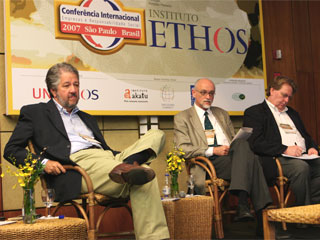Agricultural sector endeavors to cover the entire production chain
Society’s current efforts to introduce the sustainability concepts in the agricultural sector have not produced the desired effects yet. This is the opinion of Jason Clay, Vice President of the WWF, who participated in the second roundtable of the 2007 C
Having Professor Décio Zylbersztajn, of Faculdade de Economia, Administração e Contabilidade at USP (FEA-USP) as moderator, the roundtable "Social and environmental commitments in agriculture" included Cláudio Valladares Pádua, of Iniciativa Brasileira de Verificação da Atividade Agropecuária, Jason Clay, vice president of World Wildlife Fund (WWF), Fábio Trigueirinho, Secretary General of the Associação Brasileira das Indústrias de Óleos Vegetais (Abiove), and John Elkington, of SustainAbility.
According to Jason Clay, the pressures on large food producers can be felt in several situations, but, as a rule, they do not affect the entire production chain and, in fact, achieve limited results. The case of Coca-Cola, which reduced the water consumption in its production line (from almost 4 liters to 2.7 liters of water per liter of the beverage), can be considered as an important initiative. However, the use of almost 300 liters of water in the production of the sugar required for obtaining the same liter of the product has not changed.
In order to optimize results in the fight for sustainability, according to the Vice-President of WWF, we must adopt a selective strategy, focusing on companies along their production chain, and especially those that most impact on the natural resources. The key questions, in Jason’s opinion, lie in "consumption reduction, creation of renewable sources, and biodiversity protection".
According to Cláudio Valladares Pádua, of Iniciativa Brasileira de Verificação da Atividade Agropecuária, this monitoring of all production chain links should go through a consensus-seeking process involving all stakeholders in order to reach an agreement on the use of natural resources. Brazil, in his opinion, is a superpower in the agricultural commodities market and needs to reach minimum standards, aimed at reducing habitat and water loss and conserving biodiversity.
The experience of production chain monitoring in the soybean area was reported by the Abiove’s Secretary General Fábio Trigueirinho. According to him, the sector has recently established a roundtable with three chambers comprising representatives of producers, industry, commerce, financial institutions and civil society. This body is currently developing principles and criteria to be completed in 18 months.
Among the agreed initiatives, there is the soybean production moratorium in the Amazon Region, the traders’ commitment to canceling the purchase of grains produced in that region, and the creation of the Instituto para o Agronegócio Responsável – ARES (Responsible Agribusiness Institute). Besides, he added, there are discussions underway on how to add value to the product as a means of improving sustainability.
John Elkington, of SustainAbility, sounded very pessimistic about the global capacity to feed over 9 billion people by the end of this century. "I’m not a religious person, but I do believe we’ll need a miracle to meet this objective", he joked. Despite all this, Elkington gave some examples of global companies that developed innovative projects to increase agricultural productivity involving some of the poorest populations in the world. In his opinion, it will be necessary to count on the ability to create unexpected solutions of areas such as genetically modified foods or the so-called functional foods.
Fonte: Instituto Ethos

> Petrobras Watch the Petrobras coverage
© Copyright 2007, Instituto Ethos de Responsabilidade Social Empresarial. Todos os direitos reservados






